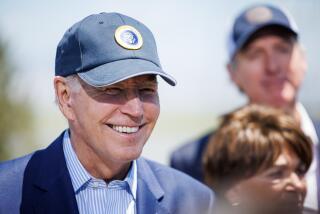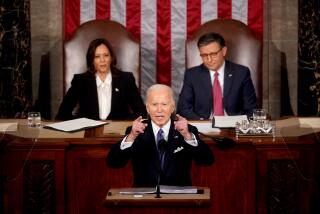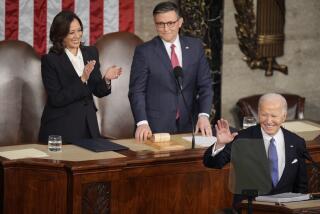Cheney Pleads for Patience on Iraq
With violence growing by the day in Iraq and hopes for stability fading, Vice President Dick Cheney pleaded for patience today among American voters, with the reminder that it took the United States more than a decade to create a lasting government.
His remarks, while remaining optimistic, represented a shift in his recent campaign declarations about Iraq, giving unspoken acknowledgment of the disruption caused by the anti-U.S. insurgency that has brought a growing toll among Iraqis and a surge in deaths of U.S. troops.
Speaking at a roundtable of 13 New Mexicans — mostly doctors and educators whose questions focused largely on healthcare, medical malpractice insurance costs and education — the vice president also issued a stepped up denunciation of Sen. John F. Kerry, the Democratic presidential candidate. Cheney said Kerry delivered an “incoherent” performance on the Don Imus radio show on Wednesday.
On the air on Wednesday, Kerry said in response to the host’s question that there were no circumstances that warranted going to war against Saddam Hussein in Iraq.
“No, there are none that I see,” Kerry said, during a lengthy discussion about the war.
Citing no specific comments that led him to challenge the way Kerry responded, Cheney said: “He was absolutely incoherent. I went back and read the transcript — what did he say?”
The vice president added that Imus, who has indicated he views Kerry favorably, “said he had no idea what he said.”
“I think a lot of people have that problem,” Cheney said.
In a response, Phil Singer, a Kerry spokesman, said, “The only thing incoherent is the Bush Iraq policy that has left the U.S. alone bearing the military burden and footing the bill for the war.
“When is Dick Cheney going to explain what the White House plan is for stabilizing the situation on the ground in Iraq? George Bush’s wrong Iraq policies have taken America in the wrong direction and it’s time for him to come clean with the public about what’s going on there,” Singer said in an e-mailed statement.
Cheney was among the most aggressive administration leaders pressing for the war against Iraq, and among those who offered the most optimistic assessments of how the U.S. troops would be greeted by Iraqis freed of Saddam Hussein’s leadership.
He generally devotes half his campaign speech to Iraq and what he presents as related issues — the administration’s campaign against terrorism, the invasion in Iraq, and the efforts to establish democratic governments in Afghanistan and Iraq.
But Cheney went out of his way today — the first day of a cross-country trip with stops scheduled in Nevada and Oregon — to urge Americans to take a long view of Iraq’s problems and the U.S. response.
“These are not easy tasks. They are very difficult tasks,” he said. “People have no prior experience with democracy.”
Among the milestones he cited is the scheduled election in January of a national assembly — although the violence has put in question whether the election will take place as scheduled.
“There’s a bit of a tendency, I think to want to know why isn’t it all fixed now, how come it’s taken 18 months in Iraq,” the vice president said in his opening remarks, delivered off the cuff.
He continued:
“I’d remind you how long it took us. From the time we wrote our Declaration of Independence until we had a Constitution in place and a democratically elected government that we could live with was 13 years, 1776 to 1789. So, we shouldn’t be surprised if there are bumps along the way. There will be.”
Moving into his political pitch, he said, “The key, of course, has been the president’s leadership as well as the enormous talent and dedication of the United States military.”
Cheney stepped back, slightly, from his oft-stated view that Hussein had links to Al Qaeda.
In addressing the elements in the administration’s charge against Hussein, Cheney said that the former Iraqi leader had had long ties to terrorism — and that his government was listed as a state sponsor of terrorist activities year after year in an annual State Department study.
But the vice president did not specifically report that Hussein’s connection to terrorists included a link to the organization blamed from the Sept. 11, 2001 attacks on the United States.
More to Read
Start your day right
Sign up for Essential California for news, features and recommendations from the L.A. Times and beyond in your inbox six days a week.
You may occasionally receive promotional content from the Los Angeles Times.






